Imogen Clark's Blog, page 13
March 21, 2020
The Class of 2020
Well, what strange times we are suddenly living in. I am fortunate enough that all my friends and family are currently well, I have food in my cupboards and a job that won’t stop paying me because of Coronavirus. I am feeling very privileged right now.
 Photo by Jasmin Sessler on Unsplash
Photo by Jasmin Sessler on UnsplashBut all is not completely rosy chez moi. Whilst I can do as I’m told, stay away from public places, not stock-pile food and other necessities and exercise social distancing because I am an adult and I have the wisdom accumulated over five decades on the planet, it’s still hard to deal with. Our twenty-fifth wedding anniversary falls over Easter and my husband and I had a special trip planned, now cancelled of course. We were due to attend the wedding of our friends’ daughter, the first such event for us. And we had tickets for a variety of shows over the next few weeks that have all now been postponed.
And it’s a bummer. I was looking forward to every one of those events and I am very sad that they have now all vanished from my diary. But I will get over it. Worse things happen at sea and all that.
But it’s different for my children . . .
It is far harder, I think, for the younger members of our community to take all this in their stride. My youngest was due to take his CGSE exams this summer. There will now be no exams. He will be given a grade, we gather, based on his performance over the whole of the two year course which, we are assured, will fairly reflect his achievement.
In many ways, being judged over a longer period rather than on his performance on an arbitrary day in June is likely to be more representative of his ability. Yet, that’s not how he sees it. Not at all. He has been gearing up to these exams for his whole life. The UK school system is about testing pretty much from day one. The entire curriculum is focused around the end result and even if you resent every minute spent at school, you can’t help but come out with the idea that the final exams are the be all and end all of it.
And now that has gone. I heard one of his friends say that they felt their results would be forever tainted, as if the Class of 2020 didn’t really have to work for what they were given and therefore theirs would be somehow less valuable than results obtained in other years. He feels that he will never be robustly tested, will be robbed of the chance to prove how he can think under pressure. He is also undertaking intensive training to become a ballet dancer, spending almost as much time training as he does in school. Secretly, I imagine that he was hoping to prove himself capable in more ways than one.
There are many others who this will hit hard, as well – those due to be taking A levels are also in the crossfire and another of my children is due to sit University Finals this summer too, something that is, as yet, still shrouded in mystery.
The list of things that are important to our children and yet cancelled and never to be replaced goes on – sporting events trained hard for, shows that will never hit the stage, and smaller, but no less important, things like the rituals associated with the last day of school, the Year 11 prom, all those photos and silly videos that my other children have of their special times which my son will not.
it makes me want to cry . . .
and in fact, yesterday I did just that, in the street, prompted by nothing in particular except the huge weight of disappointment that hangs heavy over my children right now when usually they are tightly cocooned in a sparkling veil of excitement and positivity.
I have told them that they will look back over this time and be telling the tales for years to come. Only they are the #classof2020 having to deal with these extraordinary circumstances (or at least I hope it will just be them.) But right now, I’m not sure that that is helping much. I am left just holding them tightly as they cry and agreeing with them that it’s not fair, that everything is completely crap and that I totally understand ( although I can’t understand entirely – it’s not my pain after all.)
I have no doubt that most of the Class of 2020 will bounce back, they are resilient, they will get used to what has happened and it will become their new normal. And in time, it will become a story to dine out on for years to come.
But right now my heart is breaking for every last one of them xxxx
 Photo by Kelly Sikkema on Unsplash
Photo by Kelly Sikkema on UnsplashThe post The Class of 2020 appeared first on Imogen Clark.
March 6, 2020
And the winner is . . .
. . . not me!
You may have heard that my book Where the Story Starts was lucky enough to be shortlisted for the Romantic Novelist Association’s Contemporary Romantic Novel of 2020. You could have knocked me down with a feather when I heard. I don’t really think of myself as a romantic novelist but my book does contains three love stories and so it seems that I am, or at least for that book.
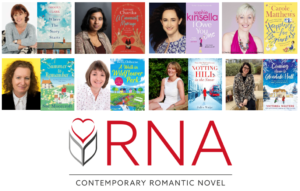
So, on Monday this week I braved Coronavirus and headed down to the Awards Ceremony in London. Of course, there was a problem with the trains but I criss-crossed my way down the country with a bunch of other hardy travellers. We had quite a Dunkirk spirit going by the end, like we Brits do in times of adversity.
London was uncharacteristically quiet. There were fewer Londoners on the streets, I imagine, but more noticeable was the lack of tourists. Not at all good for London, but great for me as there were seats on the tube and everything.
Before the ceremony I went out for dinner with my editor and some other people from my publishers, Lake Union. You have to understand that being taken out for dinner (other than by my husband) is very new for me. Back in my lawyering days, it happened a lot and was even a bit of a nuisance, but since I’ve been a ‘stay at home’ mum such occurrences have been a bit thin on the ground. And it was dinner in a posh restaurant in Soho to boot! I tried not to be too giddy and to behave with appropriate decorum!
Anyway, from there it was a hop to the Awards Ceremony itself. Copies of my books were displayed alongside those by Jojo Moyes, Sophie Kinsella and Anton du Beke. (I know – mad! He was there too!) We had a table with flowers and sparkling glassware, which was lovely, and pretty soon they were announcing my category, my name as a shortlisted author . . . and then Sue Moorcroft as the winner!
And I have to say, and this is really quite honest, the shadow of the merest flicker of disappointment crossed my heart for less than a second and then it was gone. I was absolutely totally fine about not winning and my congratulatory smile for Sue was broad and genuine.
On the way home I thought about this. I mean, you would expect to be a little disappointed, crushed even and I really wasn’t. Why was that? Well, the answer was simple – I had absolutely no expectations of winning.
Now, this is an odd thing to unpick. It wasn’t that I didn’t think my book was any good. I truly believe that it is and I have thousands of five stars reviews and ratings that back me up. There was also an element of thinking that I wouldn’t win because the book didn’t really fit with the rest. I won’t spoil it in case you haven’t read it and would like to, but suffice it to say that some of the themes aren’t ones that you might expect to find in a romantic novel.
But I think the real reason that I didn’t expect to win is because I’ve been brought up with no such expectations.
Now, in no way is this a criticism of my parents, who have done an amazing job over my five decades of life, but having no expectations was just how it was when I was a girl. Back then, it wasn’t ‘nice’ to big your children up, to over-praise them either in public or at home. There was none of the modern tendency to tell a child they can do anything they put their mind to. We all knew our place and what could be reasonably expected of us within our own boundaries, and that was fine.
But I suspect that this playing down of ambition and expectation has resulted in a generation of people, and particularly women, who perhaps lack an element of self-belief and confidence. How often have I heard the phrase ‘That’s great, Imogen but don’t get your hopes up’? I have even said it to my own children. And it’s a thin line, isn’t it, between being realistic about results and pouring icy cold water on dreams and ambition? I wonder how much my own inability to celebrate achievement and expect great things is a product of a pragmatic personality or because of the way I was raised. Most probably it contains a healthy dose of both.
Don’t get me wrong – I’m not complaining about this. If you never have any expectations then you’re never going to be disappointed. But it also means that life has a very steady feel to it without any of the highs and lows that hope and disappointment can bring. And I’m not sure that’s such a great thing either. . .
 Photo by Deleece Cook on Unsplash
Photo by Deleece Cook on UnsplashThe post And the winner is . . . appeared first on Imogen Clark.
February 8, 2020
Don’t look down!
This week I started writing my seventh novel for my publishers, Lake Union Publishing. . . and I would describe my current professional state as anxious.

You would think that I’d have got the hang of this by now. After all, this will be the fourteenth book that I have penned in the last ten years, and whilst I would never describe myself as a novel-writing expert, I do have some experience. I certainly understand the basics: how to write a character, how to tell a story in a way that will keep the reader turning the pages, which words to use when.
And I love it! This part, the first draft, is my absolute favourite bit. If I could write first drafts all day every day then I would be a happy camper.
So why am I anxious?
Those people that know me will probably tell you that I am a planner. There is virtually no eventuality that might befall myself or my family that I have not, at some point, considered and made a contingency plan for. If there’s even the tiniest of outside chances that something might occur then I’m on it. I know exactly where everyone will ( or at least should ) be at any moment, how they will get there, what they need with them, what they will eat and how they will be getting home, myself included. It is fair to say that going with the flow is an alien concept to me.
Except when I’m writing a book . . . .
I can’t tell you why but it seems that in this one regard alone I am incapable of coming up with a plan. And I have tried. And failed. A lot.
Before I was published . . .
and I was just writing for myself, then this wasn’t an issue because no one had any expectations. I would set off and follow my characters where they took me, letting the story be unveiled to us all at the same time.
For me, writing a novel is a bit like doing a puzzle.
When I begin, I have the people I’m going to write about and where their current dilemma. I also have a vague idea of where I’m going, and the challenge is to get my characters ( and hopefully my readers ) to the final destination in a way that is plausible, exciting and ultimately satisfying. The game for me is to come up with new ways of arriving at The End. And I love it. You have no idea how exciting it is when I put a piece of the jigsaw down without really know where it fits only to discover several chapters later that I have created the rest of the image around it. It’s like alchemy.
But these days things are slightly different. Not only has my publisher paid me for the book as yet unwritten ( or even outlined ), thus demonstrating a faith in me that can be daunting, but I also have quite a lot of people who have enjoyed one of my books and might want to read another. If what I produce doesn’t match their expectations then you can bet your very last pound coin that they will tell me ( and the rest of the world ) in a review.
But don’t go thinking THAT this is bad.
It’s not! As I said, this is my favourite part. But it’s also super-scary. And this new book is the scariest of all. The idea I have in my head is more complicated than anything I’ve tried before and as I write this blog post I truly have no idea how it’s all going to get from where I am now to an ending.
It was Iris Murdoch who said ‘Every book is the wreck of a perfect idea’ and she was so right. And at the moment, when I’ve barely started, I can still let myself believe that I can do it, that my idea has legs and will be able to carry itself all the way to the finishing line. But the further I get into to it, the less fabulous my idea can begin to look.
This is how it feels. Imagine that you are in a dark forest at night, or swimming in a vast ocean. You have a torch or some armbands and so the little part of the forest or sea that you are in is perfectly safe. And you are happy and having fun. But what if you let your mind stray? What if you start to wonder what might be out there, beyond your little puddle of light, hiding behind a tree, watching you. Or if you looked down though the deep blue water, what might be swimming beneath you, just looking up at your vulnerable little body.
Scary huh?
Well, that’s what it feels like. The chapter I’m in is great and going well . . . but if I let myself look beyond where I currently am then the vast, dark unknown- ness of it might frighten me to death.
Yet Fear not!
This mega-scary bit doesn’t last forever. Once I get a little further into the book then the unknown parts start to look far less terrifying and eventually, I will be completely in control of my new world. I know this. Experience has shown me it time and time again. All I have to do is trust my process. And not look down!

The post Don’t look down! appeared first on Imogen Clark.
February 2, 2020
Nobody likes to be criticised.
You know what it’s like, I’m sure. You do your best work, take a step back and admire what you’ve achieved. You might even allow yourself a smug moment of pride in a job well done.
 Photo by Aziz Acharki on Unsplash
Photo by Aziz Acharki on UnsplashAnd then someone comes along and tells you that it could be improved and your bubble bursts in a spray of soapy water.
Criticism was something that I dealt with on a regular basis back when I was a solicitor. Having my drafting torn to ribbons was all part of learning to be the best I could be. Even when my boss had got out of bed on the wrong side and was being over picky, I knew how to smile graciously, accept his suggestions and make the amendments, if not with a glad heart then at least in a reasonable spirit.
But fast forward twenty years of having no one but myself to answer to and I have become far less accepting of challenge! In my little domain, I am the boss. I run my household efficiently and I do it my way without anyone telling me how. And it’s great. I only have myself to answer to and I find myself to be a not unreasonable taskmaster, especially now that I’m a bit older and have my priorities ordered in a way that suits me.
So, what’s the problem?
This week, I’ve been doing copy edits on my next book, The Last Piece. Editing is obviously an extremely important part of the writing process. By the time one of my books hits the shelves it will have been through four formal types of edit, not counting all the work that I do it on my own. And most of these edits are no problem. But the copy edit… Well, it should have its own circle of hell!
‘What is a copy edit?’
I hear you cry. It’s the part of the process when my book is reviewed to improve accuracy, readability, and fitness for its purpose, and to ensure that it is free of error, omission, inconsistency, and repetition. There also seems to be a bit of line editing thrown in for good measure which also means that my word choices, images etc are scrutinised, my timelines pored over and basically everything is put under the microscope.
And what’s wrong with that?
Nothing, of course, if you don’t mind someone punching holes in what you thought was quite a decent piece of work, one that you have sweated over for months, that you have lived and breathed, choosing almost every word as carefully as you might choose a name for your child. (That might possibly be an overstatement but I’m feeling dramatic!) As I said, criticism, constructive or otherwise can be hard to hear.
So, I’ve been getting myself in an increasingly steamy lather as I worked my way through my lovely manuscript. Firstly, there are the grammar issues It appears that English grammar has undergone a number of transformations since I was taught the basics back in the 70s. Commas are all the rage these days and they get everywhere except, it seems, in the places where I was taught to put them.
Then there are my images, which I accept can be a little quirky. But just because a word isn’t USUALLY used in that context does it mean that it’s wrong? Well, yes sometimes I have used entirely the wrong one and I have to admit to have hit on a word that sounds like the one I’m aiming for but isn’t quite right. Those edits are totally fair game. The quirkier ones though, those are all mine and I will fight to the death to protect them!
It might be crisper, she says, if you phrased that like this? Yes, it might be but then it wouldn’t be mine. It’s a writer’s turn of phrase that makes their work distinctive and in this age of Artificial Intelligence it’s even more important that the human voice is preserved and even celebrated.
Then there are the phrases that I use that the editor hasn’t come across. ‘I’ve known him since Adam was a lad’, ‘she was no better than she ought to be,’ and ‘Sea fret’ are three such, all of which would have ended up on the cutting room floor if I hadn’t leapt in to defend them!
 Photo by Steve Johnson on Unsplash
Photo by Steve Johnson on UnsplashI am aware that i sound like a prima donna!
My copy editor, Gill, is a perfectly lovely person and really good at her job. The basic problem here is that I don’t want to hear what she has to say. As I work through my manuscript, I can feel my ire coming out in my replies to her suggestions. Sometimes my use of exclamation marks gets out of hand and if I resort to capital letters then I know that the time has come to walk away from my computer and go get a cup of tea. And I always have to go through the edit twice so that I can amend the comments that I wrote on the first pass into something more reasonable.
Eventually though, after much screaming and blaspheming, I finally get to a version of the document that I can send back for corrections and everyone around me gives a huge sigh of relief that it is done and they will no longer have to put up with my stomping about the house in a fug of indignation.
Obviously, I need to learn how to deal with this better! After all, I will have to go though it at least two more times ( and hopefully many more.) And it results in a better book which can only be a good thing. But can you blame me if I find it a challenge? And the when the next one lands I’d steer well clear if I were you. I clearly need careful handling!
 Photo by Ruth Caron on Unsplash
Photo by Ruth Caron on Unsplash
The post Nobody likes to be criticised. appeared first on Imogen Clark.
January 23, 2020
Why I do a runner from parties.
I did a runner from three parties at Christmas. They were perfectly lovely parties, before you take hold of the idea that I only get invited to rubbish ones. Each was attended by an interesting mix of people that I know and some that I don’t, with tasty food, fast flowing wine and a festive fairy-lit ambiance. They were, in fact, perfect Christmas parties. And yet the latest I managed to stay to any of them was 9.45.
 Photo by Marvin Meyer on Unsplash
Photo by Marvin Meyer on UnsplashSo why is that?
The honest answer is that I’m not sure. Every year the invitations arrive and I am delighted. I RSVP with gusto and spend time thinking about what I will wear. Sometimes I even buy new outfits especially for the occasion. I enjoy the process of getting ready, will have a glass of wine as I sit at my dressing table trying to make myself look presentable. I play party music to get me in the mood and sing along as I endeavour to apply straight eye-liner with a shaking hand (I still haven’t mastered that ‘flick’.)
You would think, that given my track record, I would start at this point in the evening, to doubt the wisdom of going. After all, it’s rather like an Agatha Christie mystery that you’ve watched so many times that the ending is almost as familiar as your name. I go to a party. I sneak away before ten. There is an inevitability to it and yet I still enjoy the preparation.
so this is how your average party goes for me.
I get ready. I tell myself that this time I am going to make a bigger effort and try to stay at least until other party goers start slip away. I arrive. I am at ease. I survey the room for who I might like to talk to – friends or strangers, I don’t mind. I grab a drink and I begin, just like everyone else.
And I can work a room. I can move from group to group, dropping myself into conversations and then sliding away to the next. I’m not shy.
When the bottle comes round a second time I offer my glass up for a refill but by then I’m starting to twitch. I will probably have spoken to most of the people that I know by this point, and possibly a few that I don’t. But now something else is beginning to settle in. Small talk-itis. I’ve had enough of catching up, swapping anecdotes about the children, the Christmases had or hoped for. I want abstract, a discussion about a concept or to dig deeper into something that another guest knows about that I don’t.
ANd what’s wrong with that?
Well, nothing! The problem is that that type of conversation only seems to arrive when the bottle has been round four times or maybe five and by then I’ve stopped drinking and am bored. But it’s not just boredom – that would be unforgivably rude. This is where my introvert tendencies kick in. Suddenly, there are too many people and it’s all a bit loud. I get boxed into corners and I start to worry that I might faint ( which I do quite often.) My heart rate begins to increase with the temperature in the room and I find myself looking at my watch and wondering if I can get out of my current conversation to my coat (strategically positioned for a speedy exit) without causing offence.
And then I’ve gone. Sometimes I don’t even tell my poor husband. I will just scarper! ( He always knows where I am and I do text him just to make sure.) Next thing I know I’m walking home in the flat shoes that I brought with me because in my heart I knew that I’d be walking home early and on my own, and another party is over.
So why do i go?
Well, because I really want to have a lovely time like everyone else. When I accept the invitation I do so in hope that this will be the one when I stay. And each time I take an early bath I disappoint myself. I would love to be the last one standing, the life and soul, the reveller still dancing as the sun comes up, spinning and swaying as if no one is watching and not caring even if they are.
But I’m not. Ever. It’s not who I am (although I might have been her once) and increasingly it is looking like I never will be.
So I have two options. I either decline all invitations and see people in social situations that suit my personality better – coffee dates, dinner with friends, that kind of thing. Or I keep accepting and hope that this time will be the one where it all comes together for me and I stay to the end.
 Photo by Briana Tozour on Unsplash
Photo by Briana Tozour on UnsplashOr I suppose there is a third option. Maybe I should just accept that I am destined to always run from parties and stop seeing that as a failing on my part. After all, I do get lots of the best bits but without the hangover!
The post Why I do a runner from parties. appeared first on Imogen Clark.
January 15, 2020
Going grey gracefully
Almost exactly one year ago I decided to stop dying my har. This is how it’s going so far.

You can see from the photos of me across the rest of this site that previously my hair was dyed to a rich conker-brown which was an approximation of how I looked back when my skin was smooth and my hair was as nature intended. I have to say, I love that colour. It’s me to a tee and apart from one or two variations (which were usually misguided on my part) I had stuck with it through thick and thin.
BUt there comes a point . . .
when it becomes more difficult to maintain the illusion. If you are born (or choose to be) blonde then I imagine you can banish the tell-tale greys for longer, possibly even indefinitely but when your hair is a dark as mine then there really is nowhere to hide.
Of course, the changes didn’t happen overnight. First there was the odd grey hair which I quickly dispatched with a pair of tweezers! Next, sneaky patches of silver started appearing at my temples within days of my trips to the hairdresser. I would stand and examine them in the mirror, trying to imagine a new me with me with silver hair all over. (I couldn’t – it was just too hard.) Finally, I started to notice, particularly on photographs, that my hair was too dark for my skin tone. And that was when I decided that
something had to be done!
As I saw it, I had three options:
1. continue as I was;
2. change colour entirely or
3. let nature take its course.

I dithered for a while, running over the various ideas in my head until eventually I decided to see what colour my hair actually was under all the chemicals.
What you see above is the answer. I have really silver temples, patchy grey stripes on my crown and an odd reverse Mallen streak effect going on in my fringe.
Silver vixen I am not.
Oh, sod it! I thought. What have I got to lose? I can always just dye it back. So I stopped with the dye and waited to be transformed. But, that’s when I started to realise that
there is far more to this than just going grey . .
Choosing to go grey is so much more complicated than just what colour your hair is and now that I’m a year in I’m still finding it hard to get my head round. When it first became obvious that I had rejected the dye box, a hairdresser friend of mine who is a decade or so older than me, took me to one side as if she had a terrible truth to confess to me. ‘You need to do something about your hair,’ she whispered. ‘You’re far too young to be grey.”
I tried to dismiss her comments as coming from a generational mindset that was out of step with my own. This is the 21st century, I thought, and a woman is no longer constrained by old-fashioned ideas about how she ought to look. But I’d be lying if I said that her comments didn’t make me wobble. We are programmed to want to look young. Every other magazine advert is for some magic lotion which promises to preserve our youth and until now I’ve been proud if someone said that I didn’t look my age, as if that was something for which I could take credit rather than a result of my inherited genes.
So, suddenly catching sight of myself in the mirror and realising that I looked more like my mother than like me has been a shock. And on days when my self confidence is low it can come like a really body blow – especially as I’m also doing my best to come to terms with my menopause at the same time. The temptation to go back to the bottle can be very strong.
BUT THEN I’ve come so far . . .
and there are so many positives to having natural hair. It’s considerably cheaper for a start! I no longer have to plan hairdresser’s appointments around important dates in my diary to ensure that the myth of my dark hair can be maintained. My hair is in fabulous condition too. Without chemicals it feels soft and healthy and it has a shine that I could only achieve when I was fresh from the salon before. And I am embracing who I now am by allowing my natural hair colour to appear.
And I know that’s something that I should feel proud of but if I’m being totally honest, (shhh – say it quietly) I don’t really want to be her. I miss the old me, the one with dark hair and smooth skin, the one who didn’t have to worry about what her upper arms looked like or whether her neck was crepey. I know all that stuff is shallow and I’m a woman in my fifties who can do and feel exactly as she likes and is not constrained by the pressures that society places on her. And yet . . .
In my head, I’m still seventeen with nut-brown hair that shines like a mirror when the sun hits it and for whom this kind of rubbish is but a distant dot on a glimmering horizon. And perhaps I always will be. . .
 Photo by Adam Nieścioruk on Unsplash
Photo by Adam Nieścioruk on UnsplashThe post Going grey gracefully appeared first on Imogen Clark.
December 31, 2019
From dreaming to doing
 Photo by Jaime Handley on Unsplash
Photo by Jaime Handley on UnsplashIn 2010, I had a dream that I wrote a book. So when I woke up that’s just what I did.
Ok. You got me. To be fair, it wasn’t quite like that. First I had to come up with an idea for the plot and then learn how to actually do it but in essence that’s what happened.
And now, as we hit the end of the decade, I’m working full time as an author with four international number 1 bestselling titles behind me and a publishing contract for three more. I truly am living my own dream.
But, whilst there’s no denying that I put the hours in learning how to write a book that people want to read, the actual success came almost by chance. And if that can happen to me then it can happen to anyone.
LET’s start at the very beginning . . .
Now, ten years is a long time and it can be tricky to remember exactly how you were feeling – unless, of course, you were writing a blog at the time which is just like a very public diary. I began my blog in 2008 when I was starting to believe that my decade working as a commercial lawyer had entirely dashed any creativity out of me. It was early days for bloggers back then and I managed to build up a reasonable following by just chatting about my day to day life at home with our four children.
However, despite my habitual honesty online, it took me around six months to confess to my readers that I was writing a novel. (The links in this piece will take you back to each relevant post in case you’re interested.) I just didn’t feel brave enough to share my literary aspirations with the world. I worried that people would laugh or roll their eyes or that I would fail very publicly. So I kept it to myself. (NB: A lack of confidence is a bit of a theme to this post.)
A room of one’s own . . .
All writers need a place to write and in a busy household it can be hard to find a corner, but I knew that if I was serious then I needed to show the rest of the family. So I stole a corner of the playroom. My space was tiny, the desk just a metre square but it was all mine. I told the children that it had a forcefield around it and that anyone who went near would be zapped into oblivion! They didn’t believe me but at least they understood that it was important to me for some reason and they respected that.
 My tiny space!
My tiny space!It might sound silly but, looking back, carving out this space from our busy family home was deeply symbolic. I was telling them all that I was going to be doing something that was purely for me which was, at that stage, a first.
My First disappointment. . .
By October 2010 I had made a discovery. I didn’t write as I imagined I would. I had always assumed that my book would be a work of literary fiction, that I would set to and something akin to Mantel or Faulkes would pour forth from my fingers. It didn’t. It turned out that my writing style was nothing like theirs and whilst I hadn’t known that I was harbouring literary ambitions when I started out, it was still disappointing to discover that I didn’t have that kind of talent.
So, my solution to how to make me write more like someone else was to go back to university. A Masters in Creative Writing, I thought. That’s what I needed. The one I fancied was at Lancaster but at the time you needed a degree in English Literature to apply. Mine degree was in Law and of no use whatsoever to me.
So I started a degree course part time with the Open University. It took me six years, completing modules whilst the children were at school, and I kept writing novels throughout, producing about one a year, deciding they weren’t up to scratch and so starting again.
BUT is your book any good . . .
How do you know? How can you tell if what you’re writing would hold the attention of a reader? This was a huge conundrum. I was too scared to send out what I had in case it wasn’t ready but I had no way of knowing whether it would pass muster or not.
I came up with two solutions, both of which put me so far beyond my comfort zone that I didn’t think I’d ever get back. First, I gave my novel to my book club to read which has to go down as the most terrifying night of my writer’s life thus far ( and possibly my entire life!)
Encouraged by the book club’s response, I blogged my second novel a chapter at a time and asked for feedback from anyone who wanted to read it. Talk about walking into the lion’s den! ‘Hey world! Here’s my heart and soul on a plate and a fork to prod it with – do your worst.’
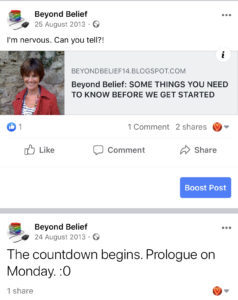
But it went well. Despite my blind terror, people seemed to like the book and if I was ever late posting a chapter I got complaints from readers eager for the next part! It was all very encouraging but I knew something still wasn’t right with what I was writing. I just hadn’t quite hit my target.
So, I started AGAIN, this time on novel 5, the one that finally became POSTCARDS FROM A STRANGER. And this time, FINALLY, I thought I might have something.
HAVE FAITH!
I had none. Even though I thought this book was better than all the others I still knew it wasn’t quite there. So I sent my book to a literary consultancy for a review. The editor liked it, gave me some helpful pointers and was generally enthusiastic.
But I didn’t really believe her.
Next I went on a course on editing. The tutors liked it too. I didn’t believe them either but by now I had been at it for six years and I had been banging on about being a writer for so long that I was going to have to do something if I was going to hang on to any self-respect. The tutors suggested that I tried to find an agent and gave me the name of three to try. So, I sent my first three chapters to them, they each asked to see more but none of them picked it up.
And so it was confirmed – my book was rubbish! I didn’t dare try anyone else. I just couldn’t bear the idea of someone taking my dream away.
By now we’re in 2016. My husband had been telling me for around two years about the self-publishing revolution that he’d been reading about but I had refused to listen. It was too big and too hard and how could I possibly put a book out into the world without having the validation of a publisher or at very least an agent?
But FINALLY I start to think that he might be on to something. Maybe I could try . . .
ENTER Lucinda Fox.

Still too scared to put my own stuff out there, I decided to try a different tack. I had written a book for young girls as part of National Write a Novel in a Month (NaNoWriMo). I could practise with that, I thought. So I picked a name, bought the domain name and began. It was a technical challenge – I’m not that able on a computer – but with a lot of help from my husband I managed to get the book up on Amazon in ebook and paperback. (And three covers and a name change later Lucinda’s books are still selling most days!)
And it was ok! The world didn’t implode and readers seemed to like it. And so finally, finally I felt brave enough to have a go myself. I did Mark Dawson’s brilliant 101 course, learned everything I needed to know and in June 2017 I published my first book under my own name.
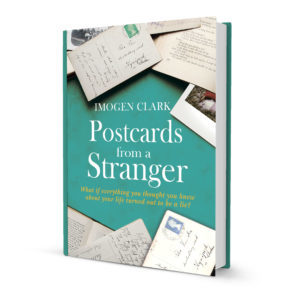
AND PEOPLE BOUGHT IT . . .
lots of people, or so it felt to me at the time. Soon I’d sold 600 copies and got plenty of ***** reviews that all raved about it. I was so excited and finally felt like I might actually be able to call myself a writer. (But not out loud, you understand!)
And then, in July 2017 around six weeks after I had published, I got an email. I thought it was a vanity publishing scam at first but it turned out that it was from a commissioning editor at Amazon Publishing, Amazon’s own publishing house. She had read the book, loved it and wondered what else I was working on.
And the rest, as they say, is history . . .
And so here I am eighteen months later. I have three books published which have all reached number 1 in at least one kindle store. I have a German translation which sat at number 1 in Germany for a month and a second one due out shortly. As I type this I have sold 415,679 books in thirty six countries and I am contracted to write another three novels and I have a multi-six figure earning business. This is the stuff of dreams for me. I mean, who knew?!
Not me, that’s for sure. When I first hit upon the idea of writing a novel when this decade began I could have had no idea where I would be as we welcome the 2020s. In fact, if you’d told me I wouldn’t have believed you.
And the moral of this story?
please don’t GIVE UP on your dreams . . .
because you never know what is waiting for you just around the corner.
 Photo by Waldemar Brandt on Unsplash
Photo by Waldemar Brandt on UnsplashThe post From dreaming to doing appeared first on Imogen Clark.
December 21, 2019
2019 – Not quite what I expected.
I began the year with a trip to a yoga retreat in Alicante. It sounds blissful (and it was) but it was actually just a thinly disguised research jaunt for the book that I was about to start, THE LAST PIECE, which will be published in July 2020. The fictitious retreat in the book is actually in Kefalonia not Spain so I had to use my imagination a bit but it wasn’t too much of a challenge.

Also in January I did a course learning how to read Tarot cards (more research.) It was absolutely fascinating but in the end I decided that this wasn’t quite right for my character and so I didn’t use my newly-found knowledge. Maybe next time . . .
Also this month I completed the proof read for WHERE THE STORY STARTS which was due to be published in June.
FEBRUARY
By February I was well into writing THE LAST PIECE and was throughly enjoying myself. I was also thinking ahead though and came up with rough ideas for three new books. My translator finished the German translation of POSTCARDS FROM A STRANGER this month too and I also reached 100,000 sales which was a fabulous milestone and resulted in bubbles being imbibed.
THE THING ABOUT CLARE, which had come out the month before, was still getting lots of PR and I was thrilled to find this piece on the magazine shelves.
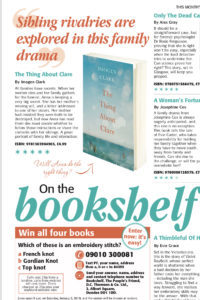
MARCH
March is all about London Book Fair and I spent a few days there attending events and parties and generally having a lovely time. Having visited the year before when I didn’t know a soul, it felt considerably easier second time around and I caught up with lots of fellow authors that I’d met online – so much nicer to actually meet face to face! Plus, my books were on the Amazon Publishing stand at Olympia – this was very cool!
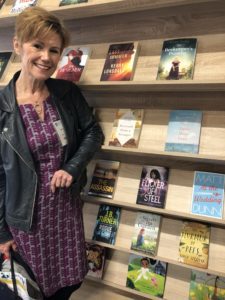
Whilst I was in London I had a wander up to Finsbury Park to do some location hunting for a scene in the new book. I lived there for a while as a student in the 1980s and was slightly disconcerted by how little I remembered of the place when I had thought I knew my way around.
At the end of the month I typed ‘The End’ on THE LAST PIECE and I sent it off to my editor Victoria at my publishers for her verdict. I then waited nervously for her feedback.
April
In April I took a couple of weeks off from writing and went on a trip to do some walking in Majorca. I have never visited the island in springtime before and was completely blown away by the extraordinary beauty and zinging colours of the flowers, oranges and lemons. It was the perfect tonic to three months of hard writing.

When I got back from Majorca I cracked on with my novella POSTCARDS AT CHRISTMAS and my books hit the Top 100 of the kindle chart in the US for the first time. Also, POSTCARDS FROM A STRANGER reached 100,000 sales which was marked by my publisher sending me a lovely commemorative framed copy as a gift.
MAY
In May, having completed two books already this year, I took some time off writing and focused instead on the business side of being an author. I worked on my website and on promotions for WHERE THE STORY STARTS which was due to launch in June.
This month my second daughter was 21 and so we had lots of family celebrations. I also took a trip to Kew Gardens to meet a friend. It was the wettest day imaginable ( after weeks of glorious sunshine) but we had a lovely time, weather notwithstanding. Here I am, about to be eaten by a gigantic glass monster. I also went to Chelsea Flower Show. I’m no gardener but I love to dream!

JUNE
June saw the launch of WHERE THE STORY STARTS. I marked the occasion with a lovely party for family and friends in a bar in Ilkley. The very clever lady at Popalicious Cakepops made these cake pops for me. Just look at the tiny little book covers!
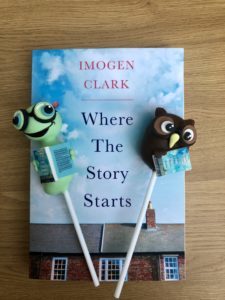
Also In June I had fabulous news. My editor loved both the manuscripts that I had submitted and as a result my publishers Lake Union offered me a four book deal. They are so inspiring to work with and I was thrilled to get the chance to continue producing books with them for a few more years.
I also did the editing of POSTCARDS AT CHRISTMAS this month and started writing a secret project just for fun. I didn’t get very far with it because my Lake Union work interrupted me but the idea is still buzzing around in my head. I plan to get back to it when time allows.
july
On the 9th my first book in German WENN DEINE ZEILEN MICH BERÜHREN was published. By the 16th it was number 1 in the German kindle charts and it stayed there for 29 days. It was also the top of the BILD.de bestseller’s list for two weeks.
An unexpected treat this month was this lovely cup and saucer that arrived to mark THE THING ABOUT CLARE reaching 50,000 sales.

AUGUST
This month I started writing the next book under my contract (working title of MISS MOUNTCASTLE’S DIARY until I come up with something better!) I started off feeling my way a little but by the time I got to the end of the month I was well under way with it and enjoying myself very much.
Also in August my translator began her work on the German version of THE THING ABOUT CLARE and I took a holiday with my family where I continued to write but also made a serious dent in my To Be Read pile.
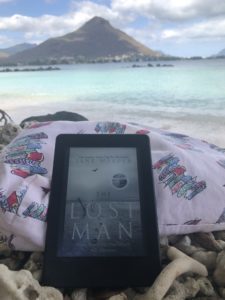
September
In September I went to Southwold in Suffolk as it’s the setting of the MOUNTCASTLE book. It really is a beautiful town, especially out of season, and I always love being by the sea. I managed to find all the locations that I needed and took plenty of photos so that I didn’t forget anything. This terrace just perfect for Miss Mountcastle’s house. It wasn’t quite where I had imagined her to live so a little bit of judicious rewriting followed but I think the house I chose is just right.

Also this month WHERE THE STORY STARTS reached 50,000 sales less than three months after it was published and it also hit number 1 in the UK kindle store, making it a three out of three track record for my books. Needless to say, I was delighted! The German translation also hit 50,000 sales this month too.
OCTOBER
This month my sequel novella POSTCARDS AT CHRISTMAS was published in ebook with the audiobook version following in November. I also finished the first draft of the MOUNTCASTLE book and sent it to my editor for her comments.
Then I went on a trip to Dublin which was my first visit to Ireland.The highlight of my trip was the Book of Kells and was completely transfixed by it. So old and so very, very beautiful.

NOvember
In November I was mainly editing THE LAST PIECE but I also started making plans for the next book which I hope to start writing in February 2020. Having had just the merest glimmer of an idea, I began to flesh out the characters which makes it all feel a little less daunting, although there is still a long way to go before I can put fingers to keyboard.
Also this month WHERE THE STORY STARTS hit 100,000 sales and I finally managed to get my website looking something like I wanted and so was able to start blogging again. I love my blog, especially as that’s where my writing started back in 2008. There are posts going all the way back to the beginning still on the site if you want to investigate.
Finally, I went to London to see an exhibition of William Blake’s illustrations which were both beautiful and also a little disturbing.

december
This month I got some feedback from my editor on the first draft of MOUNTCASTLE and so I have a few tweeks to make before I deliver it to the publisher at the end of January. Then I will start on the next one, working title, THE GANG OF FOUR.
I also received the cover for the German version of THE THING ABOUT CLARE which will be published next April. It’s so interesting how the publishers position the books for the various markets. This cover couldn’t be more different from its English equivalent.

And finally, as I type this a few days before Christmas I have just sold my 400,000th book. You won’t be surprised to hear that I have to pinch myself . . . often!
2019 in a nutshell
So, there you have it – my 2019 as a writer. Obviously lots of other things happened too. I have travelled a lot, my family has been involved in two very successful stage shows, my eldest graduated, got her dream job and moved to London and we also had a fabulous set of GCSE results to celebrate too.
I have read 85 books, (so far – there’s still a week or so to go) have been to the cinema 32 times and the theatre too. I have written around a quarter of a million words. I have laughed and cried and been excited and anxious and basically run the whole gamut of human emotions just like everyone els – lots of it in public on my various social media channels! If you’re interested in my news as it happens instead of in a huge pile like this then you can sign up for MY NEWSLETTER by filling in the box on the right of this page and you’ll get it in monthly chunks! Also, have a look for me on Facebook and Instagram using the links below.
when i sat down . . .
this time last year to write my goals for the coming year, I had no idea what was waiting for me. It’s been such an exciting twelve months and I don’t think I’ve stopped smiling for more than ten minutes all year. And I want to say THANK YOU to you for sticking with me, for buying, reading and reviewing my books and for listening to me fizz with excitement without rolling your eyes too much.
And now I’ll wish you a very happy 2020. I hope that it brings you all you could wish for.

The post 2019 – Not quite what I expected. appeared first on Imogen Clark.
December 15, 2019
Just what is your Definition of Success?

Setting goals – it’s all the rage, isn’t it, particularly at this time of year? I do it too and no doubt will blog about it as we drift closer to the turn of the decade. But what is just as important as setting the goals is deciding what it is that you’re trying to achieve, what it is you’re aiming for. What would success actually look like for you?
You’ll know, I’m sure, that simply plucking a goal from the air and harbouring a desire to reach it just doesn’t cut the mustard any more. A target needs to fulfil a whole range of criteria if it’s going to call itself proper and don’t forget that we have that awful but convenient acronym to help (Specific, Measurable, Achievable, Realistic and Timely) so we don’t go around setting ourselves up to fail with crappy ambitions. Apparently, we have to apply these tests to our goals for if not, how will we know when we have reached them?
and i suppose they have a point . . .
Take my line of work as an example. You might think that back when I started out I set myself the goal of being a successful author. Sounds obvious, doesn’t it? But put ten writers in a room and they will each give you a different idea of what it means to have arrived. For some, this might be winning prizes, receiving validation from the publishing world in the form of a recognised award.

For others, success might be measured in the size of an advance, the number of book sales, seeing posters of their titles on the side of a bus, being on the shelves in a supermarket or even becoming a household name.
Other writers have far more modest goals in mind, perhaps happy with a smaller ambition or possibly not daring to dream big for fear of appearing foolish or deluded.
And of course, things change. What might have seemed impossible initially may float within reach given time . . . or indeed goals can be reduced as the sharp teeth of reality bite unto the soft underbelly of aspiration.
So, when i first set a goal . . .
for my own writing, I thought long and hard about what success would look like for me. I considered all the usual kinds of marker and a few more besides. But when it came down to it ONE THING felt more important than anything else. This was what I was aiming for, would mark out when I had achieved success within my own terms and is still just as relevant today as it was all those years ago.
AND WHAT IS THAT ONE THING?!
Well, we’ll get to that in a moment. But first – an anecdote. Yesterday I attended my child’s parents’ evening at school. We had finished talking about her progress with one particular teacher and I was just standing up to move onto the next appointment when the teacher put out her hand to stop me. ‘Can I just say,’ she said, her gaze dropping to the desk for the first time since I’d sat down, ‘I’ve read all your books. I thought they were great.’
Her comments took me by surprise and I felt almost as awkward accepting the praise as the teacher seemed to feel giving it. I blushed furiously, muttering my thanks and giving her what I hoped was a heart-felt smile before slipping away to a place where I could go back to being just another student’s mum.

LIKE MOST PEOPLE . . .
I’m not that good with compliments, even though I try to accept them graciously, but later I thought about the encounter and was thrilled by it (even though I’m not sure that was the impression that I might have left the teacher with!)
Of course it’s lovely for someone to praise something that you worked hard on and it gives you a warm tingle in your heart. But for me this was more than that. Comments like hers go straight to the core of my definition of success.
And so . . . drumroll please . . . here is what I wrote as my definition of success all those years ago.
Success = having someone I don’t know and who knows what they’re talking about like my book.
That was, and still is, my definition of success as an author. That was what I set out to achieve and it continues to be just as relevant to me today, four published books and 400,000 sales later. And it doesn’t matter to me whether the person knows what they are talking about because they are a reader or a Booker Prize judge – both opinions are equally valid.
And when it happens then I’m happy because I know I have hit my target!

The post Just what is your Definition of Success? appeared first on Imogen Clark.
November 29, 2019
Where the bodies are buried.

Life-long friends . . .
Last weekend, I was lucky enough to spend time with people that have known me for more than half my lifetime. Friends like that are a rare breed. People come and go all the time. Some friendships are fleeting, others last a little longer. But not many have been with me constantly for decades.
The special thing about these particular people is that we all began our careers together, fresh from Law School, back in 1989.
And this wasn’t just any old job.
When I walked into that office building on 4th September 1989, in my interview suit and a pair of heels that were already pinching, it represented the pinnacle of my endeavours thus far in life. I had decided to become a solicitor in a dull music lesson when I was 14, had been striving towards that goal ever since and now, finally. I had arrived.
But it wasn’t me standing in the reception of Booth & Co, fresh-faced and nervous, that morning. There were ten of us. A whole team of articled clerks, ready-made mates, conspirators, congratulators, commiserators. I was embarking on this adventure with a gang.
Fast-forward thirty years . . .
and of those original ten pioneers I am still in touch with four and I would consider two as close friends. Our paths through life have diverged over the years – I left the law entirely after all – but we have stayed close.

So, why am I telling you this now?
Well, it made me think about why some people stay with us as we progress through life and others get left by the wayside. It’s not difficult to drift away from friendships. Very often our roads split apart. People move on, get married, (or divorced), change their outlooks or move away and yet, despite all this, we still hang onto those special few.
I reckon it’s because those people know where the bodies are buried!!
I don’t mean that in a sinister way. I don’t have any bodies buried anywhere – honestly! But the friends that have stayed important to me over the years are often there because of our shared experiences of life. And of those, the ones that were with me as a teenager or young adult are the most precious.
For me, it’s all about those shared firsts. First drinks, first loves, first heartbreaks, the first time you really mess something up at work and think that you will be shot on sight. These experiences stay with you as you move through life because the emotional response that you had to them at that time, the first time that you had to deal with that particular issue, remain fresh.
And the people that you confided in, who held your hand, (or your hair!), who talked you down from the edge – those are the ones that I feel a need to hold onto.

They are the friends that understand you, who know how you tick. They can hold you accountable in a way that newer friends might not. They see straight through you if you’re trying to be untrue to yourself. They let you laugh at yourself because they know where your journey started and they know which parts are funny.
And that is why we met up to celebrate thirty years of friendship, older, wiser, definitely greyer but still just as close as we were decades ago.
Because, for me, friends like that are worth their weight in gold.
The post Where the bodies are buried. appeared first on Imogen Clark.



